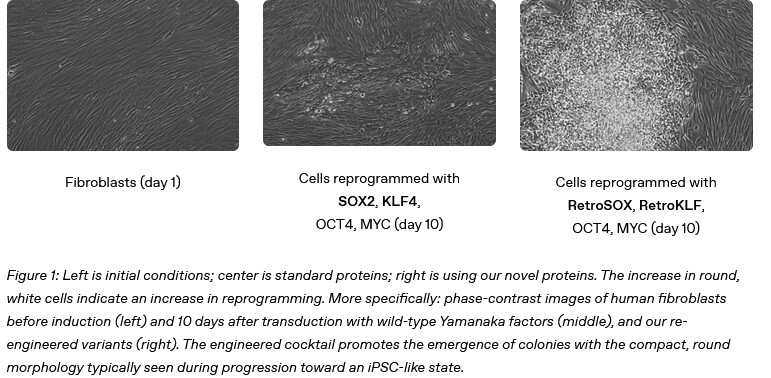OpenAI and Retro Biosciences achieve 50x increase in expressing stem cell reprogramming markers.
At OpenAI, we believe that AI can meaningfully accelerate life science innovation. To test this belief, we collaborated with the Applied AI team at Retro Bio, a longevity biotech startup, to create and research the impact of GPT‑4b micro, a miniature version of GPT‑4o specialized for protein engineering.
We are excited to share that we’ve successfully leveraged GPT‑4b micro to design novel and significantly enhanced variants of the Yamanaka factors, a set of proteins which led to a Nobel Prize for their role in generating induced pluripotent stem cells (iPSCs) and rejuvenating cells. They have also been used to develop therapeutics to combat blindness, reverse diabetes, treat infertility, and address organ shortages.
In vitro, these redesigned proteins achieved greater than a 50-fold higher expression of stem cell reprogramming markers than wild-type controls. They also demonstrated enhanced DNA damage repair capabilities, indicating higher rejuvenation potential compared to baseline. This finding, made in early 2025, has now been validated by replication across multiple donors, cell types, and delivery methods, with confirmation of full pluripotency and genomic stability in derived iPSC lines. To ensure the findings are discoverable and replicable to benefit the life sciences industry, we are now sharing insights into the research and development of GPT‑4b micro.
…
During development we observed the emergence of scaling laws similar to those seen in language models—larger models trained on larger datasets yielded predictable gains in perplexity and downstream protein benchmarks, allowing us to iterate at small scale before training the final GPT‑4b micro model. However, in silico evals for protein AI models are often of limited value, as it is unclear if such improvements translate to increased utility in the real world. To demonstrate that the model is capable of accelerating therapeutic development, we worked with Retro’s scientists, who used the model to re-engineer proteins relevant to their cell-reprogramming research program.
https://openai.com/index/accelerating-life-sciences-research-with-retro-biosciences/
